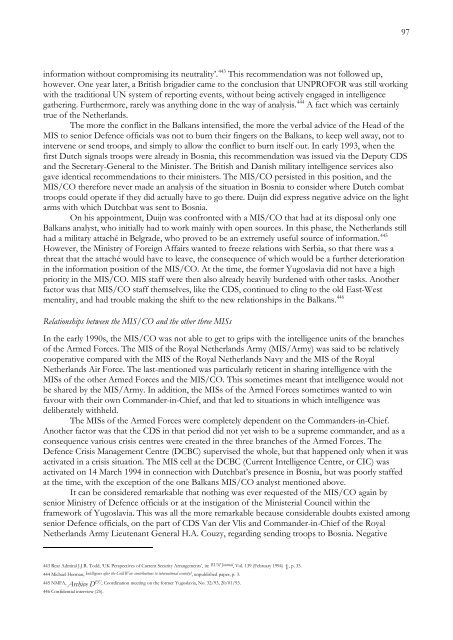C. Wiebes - Intelligence en de oorlog in Bosnië 1992-1995. De rol van de inlichtingen- en veiligheidsdiensten - Engels
C. Wiebes - Intelligence en de oorlog in Bosnië 1992-1995. De rol van de inlichtingen- en veiligheidsdiensten - Engels
C. Wiebes - Intelligence en de oorlog in Bosnië 1992-1995. De rol van de inlichtingen- en veiligheidsdiensten - Engels
- No tags were found...
You also want an ePaper? Increase the reach of your titles
YUMPU automatically turns print PDFs into web optimized ePapers that Google loves.
97<strong>in</strong>formation without compromis<strong>in</strong>g its neutrality’. 443 This recomm<strong>en</strong>dation was not followed up,however. One year later, a British brigadier came to the conclusion that UNPROFOR was still work<strong>in</strong>gwith the traditional UN system of report<strong>in</strong>g ev<strong>en</strong>ts, without be<strong>in</strong>g actively <strong>en</strong>gaged <strong>in</strong> <strong>in</strong>tellig<strong>en</strong>cegather<strong>in</strong>g. Furthermore, rarely was anyth<strong>in</strong>g done <strong>in</strong> the way of analysis. 444 A fact which was certa<strong>in</strong>lytrue of the Netherlands.The more the conflict <strong>in</strong> the Balkans <strong>in</strong>t<strong>en</strong>sified, the more the verbal advice of the Head of theMIS to s<strong>en</strong>ior <strong>De</strong>f<strong>en</strong>ce officials was not to burn their f<strong>in</strong>gers on the Balkans, to keep well away, not to<strong>in</strong>terv<strong>en</strong>e or s<strong>en</strong>d troops, and simply to allow the conflict to burn itself out. In early 1993, wh<strong>en</strong> thefirst Dutch signals troops were already <strong>in</strong> Bosnia, this recomm<strong>en</strong>dation was issued via the <strong>De</strong>puty CDSand the Secretary-G<strong>en</strong>eral to the M<strong>in</strong>ister. The British and Danish military <strong>in</strong>tellig<strong>en</strong>ce services alsogave id<strong>en</strong>tical recomm<strong>en</strong>dations to their m<strong>in</strong>isters. The MIS/CO persisted <strong>in</strong> this position, and theMIS/CO therefore never ma<strong>de</strong> an analysis of the situation <strong>in</strong> Bosnia to consi<strong>de</strong>r where Dutch combattroops could operate if they did actually have to go there. Duijn did express negative advice on the lightarms with which Dutchbat was s<strong>en</strong>t to Bosnia.On his appo<strong>in</strong>tm<strong>en</strong>t, Duijn was confronted with a MIS/CO that had at its disposal only oneBalkans analyst, who <strong>in</strong>itially had to work ma<strong>in</strong>ly with op<strong>en</strong> sources. In this phase, the Netherlands stillhad a military attaché <strong>in</strong> Belgra<strong>de</strong>, who proved to be an extremely useful source of <strong>in</strong>formation. 445However, the M<strong>in</strong>istry of Foreign Affairs wanted to freeze relations with Serbia, so that there was athreat that the attaché would have to leave, the consequ<strong>en</strong>ce of which would be a further <strong>de</strong>terioration<strong>in</strong> the <strong>in</strong>formation position of the MIS/CO. At the time, the former Yugoslavia did not have a highpriority <strong>in</strong> the MIS/CO. MIS staff were th<strong>en</strong> also already heavily burd<strong>en</strong>ed with other tasks. Anotherfactor was that MIS/CO staff themselves, like the CDS, cont<strong>in</strong>ued to cl<strong>in</strong>g to the old East-Westm<strong>en</strong>tality, and had trouble mak<strong>in</strong>g the shift to the new relationships <strong>in</strong> the Balkans. 446Relationships betwe<strong>en</strong> the MIS/CO and the other three MISsIn the early 1990s, the MIS/CO was not able to get to grips with the <strong>in</strong>tellig<strong>en</strong>ce units of the branchesof the Armed Forces. The MIS of the Royal Netherlands Army (MIS/Army) was said to be relativelycooperative compared with the MIS of the Royal Netherlands Navy and the MIS of the RoyalNetherlands Air Force. The last-m<strong>en</strong>tioned was particularly retic<strong>en</strong>t <strong>in</strong> shar<strong>in</strong>g <strong>in</strong>tellig<strong>en</strong>ce with theMISs of the other Armed Forces and the MIS/CO. This sometimes meant that <strong>in</strong>tellig<strong>en</strong>ce would notbe shared by the MIS/Army. In addition, the MISs of the Armed Forces sometimes wanted to w<strong>in</strong>favour with their own Comman<strong>de</strong>r-<strong>in</strong>-Chief, and that led to situations <strong>in</strong> which <strong>in</strong>tellig<strong>en</strong>ce was<strong>de</strong>liberately withheld.The MISs of the Armed Forces were completely <strong>de</strong>p<strong>en</strong>d<strong>en</strong>t on the Comman<strong>de</strong>rs-<strong>in</strong>-Chief.Another factor was that the CDS <strong>in</strong> that period did not yet wish to be a supreme comman<strong>de</strong>r, and as aconsequ<strong>en</strong>ce various crisis c<strong>en</strong>tres were created <strong>in</strong> the three branches of the Armed Forces. The<strong>De</strong>f<strong>en</strong>ce Crisis Managem<strong>en</strong>t C<strong>en</strong>tre (DCBC) supervised the whole, but that happ<strong>en</strong>ed only wh<strong>en</strong> it wasactivated <strong>in</strong> a crisis situation. The MIS cell at the DCBC (Curr<strong>en</strong>t <strong>Intellig<strong>en</strong>ce</strong> C<strong>en</strong>tre, or CIC) wasactivated on 14 March 1994 <strong>in</strong> connection with Dutchbat’s pres<strong>en</strong>ce <strong>in</strong> Bosnia, but was poorly staffedat the time, with the exception of the one Balkans MIS/CO analyst m<strong>en</strong>tioned above.It can be consi<strong>de</strong>red remarkable that noth<strong>in</strong>g was ever requested of the MIS/CO aga<strong>in</strong> bys<strong>en</strong>ior M<strong>in</strong>istry of <strong>De</strong>f<strong>en</strong>ce officials or at the <strong>in</strong>stigation of the M<strong>in</strong>isterial Council with<strong>in</strong> theframework of Yugoslavia. This was all the more remarkable because consi<strong>de</strong>rable doubts existed amongs<strong>en</strong>ior <strong>De</strong>f<strong>en</strong>ce officials, on the part of CDS Van <strong>de</strong>r Vlis and Comman<strong>de</strong>r-<strong>in</strong>-Chief of the RoyalNetherlands Army Lieut<strong>en</strong>ant G<strong>en</strong>eral H.A. Couzy, regard<strong>in</strong>g s<strong>en</strong>d<strong>in</strong>g troops to Bosnia. Negative443 Rear Admiral J.J.R. Todd, ‘UK Perspectives of Curr<strong>en</strong>t Security Arrangem<strong>en</strong>ts’, <strong>in</strong>: RUSI Journal, Vol. 139 (February 1994) 1 , p. 35.444 Michael Herman, <strong>Intellig<strong>en</strong>ce</strong> after the Cold War: contributions to <strong>in</strong>ternational security?, unpublished paper, p. 3.445 NMFA, Archive D EU , Coord<strong>in</strong>ation meet<strong>in</strong>g on the former Yugoslavia, No. 32/93, 20/01/93.446 Confid<strong>en</strong>tial <strong>in</strong>terview (25).





